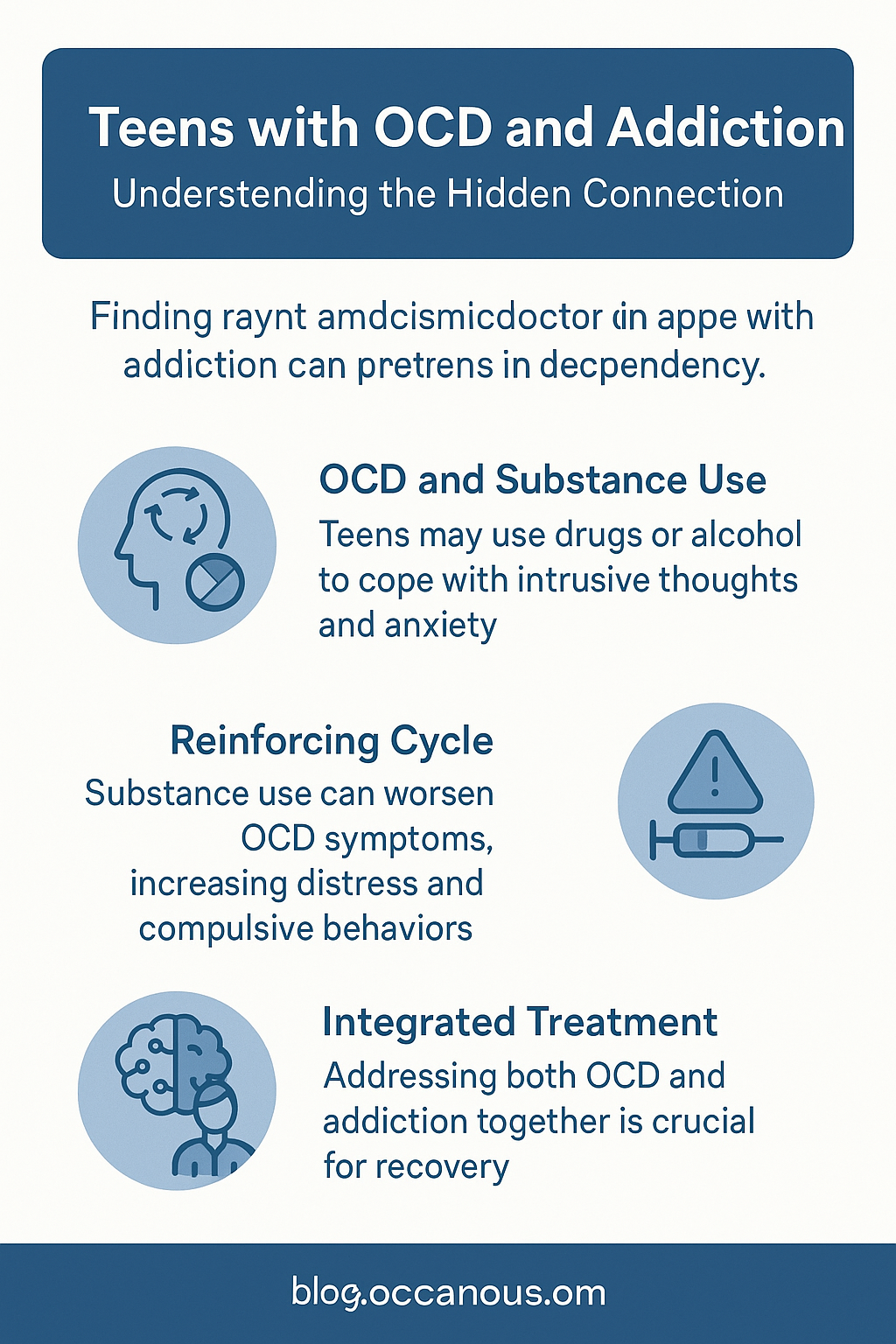Supporting teens dealing with both OCD and addiction is not always as straightforward as it might look on the surface. A lot is going on behind the scenes, especially when two conditions overlap and reinforce each other. I have found that understanding what is really happening, considering the challenges teens face, and using some solid strategies can make a real difference on this adventure.
Understanding OCD and Addiction in Teens
OCD, or Obsessive Compulsive Disorder, is a mental health condition that shows up as repetitive, unwanted thoughts (obsessions) and specific behaviors or rituals the person feels they need to perform (compulsions). When you mix in addiction, such as substance use, vaping, or gaming, things get even more complicated. Each condition can fuel the other. For instance, a teen might use substances in an attempt to quiet intrusive thoughts or perform rituals to handle stress brought on by their addictive behaviors.
This connection doesn’t happen accidentally. OCD and addiction often spin in the same cycles of anxiety and relief, which is why it is essential to look at both problems together rather than addressing one and ignoring the other. Some teens might find temporary relief by using addictive behaviors, only to have the pattern repeat and strengthen both sets of challenges.
Key Principles for Helping Teens Facing Both OCD and Addiction
Helping a teen with OCD and addiction means mixing empathy, consistency, and a concrete plan. Here are some key things that really work:
- Nonjudgmental Support: Teens are susceptible to criticism or blame for their actions. Supportive listening and acceptance go a long way toward harsh discipline or lectures.
- Consistency and Boundaries: Clear routines and boundaries make life less unpredictable and cut down on triggers that spark compulsions or cravings. Consistency provides a stabilizing effect during challenging times.
- Collaboration: Having the teen, family, and professional team up is usually much more effective than taking it on alone. Honest conversations and shared goals keep everyone on track.
Step-by-Step Strategies for Effective Support
Let us get into some practical steps you can take that truly make an impact when supporting a teen dealing with both OCD and addiction:
- Learn the Basics About Both Conditions: Understanding what triggers OCD obsessions and compulsions is as essential as knowing how addiction changes thinking and behavior. Reliable sources, such as the International OCD Foundation and SAMHSA, are excellent places to find trustworthy information.
- Encourage Open Communication: Creating a judgment-free zone makes it easier for teens to open up and feel less alone. You might say, “I’m here to listen if you want to talk,” rather than push or lecture.
- Help Build Healthy Routines: Maintaining a balanced day-to-day life—with regular sleep, meals, and exercise—can help lower stress and manage both compulsions and addictive urges. Predictability can be comforting.
- Model Healthy Coping Skills: Teens Notice More Than They Let On. Showing how you handle your own challenging emotions, practice self-care, and set boundaries often teaches more than words ever could.
- Address Avoidance and Accommodation: Try to avoid enabling compulsions or addictive behaviors, even if it feels easier in the moment. This may mean not giving out money for harmful habits, or gently encouraging your teen to face small fears rather than always helping them avoid anxiety triggers.
- Stay Calm During Setbacks: Slips and setbacks happen. Remaining steady and not panicking helps teens feel like they can keep trying, even when things are tough.
Challenges You Might Run Into (& How to Respond)
There are some tricky issues to keep an eye out for, so you do not get discouraged:
- Resistance to Help: Teens can be private or afraid of being judged. Just being available and not taking distancing personally can help them come around in their own time.
- Stigma: Concerns about what others think can make teens want to hide OCD or addiction. Remind them both are real medical conditions, not character flaws.
- Bumpy Progress: It is common to feel like progress is slow, with plenty of ups and downs. Acknowledging even small wins, like trying a new therapy or being honest about a setback, keeps things moving forward.
When Things Get Complicated
Watch for signs that call for immediate professional support. This can include sudden personality changes, any talk of self-harm, or signs that your teen is taking significant risks with substances. Do not try to handle these scenarios on your own. Reaching out for help is the right move at this point.
Evidence-Based Approaches That Actually Work
When teens get professional help, these therapies often have a good track record for both OCD and addiction:
- Cognitive Behavioral Therapy (CBT): CBT helps teens identify the connections between their thoughts, feelings, and behaviors. CBT for OCD usually includes ERP (Exposure and Response Prevention), helping build tolerance to anxiety triggers. For addiction, CBT teaches how to spot triggers and create healthier coping skills.
- Family-Based Therapy: Also known as Family Systems Therapy, it brings everyone together and looks at ways family dynamics may be unwittingly feeding into the cycle of OCD or addiction.
- Medication: Doctors sometimes prescribe medicines for OCD or addiction if symptoms are getting in the way of daily life. This requires careful supervision and ongoing communication with healthcare providers.
- Peer Support Groups: Resources such as teen-centered 12-step groups, SMART Recovery, or community meetups help teens feel less isolated. Simply connecting with others who genuinely understand can go a long way.
Everyday Habits That Make Recovery Stick
Small daily habits really add up in recovery. Here are some ways to keep things manageable:
- Keep Stress Levels Low: Activities such as yoga, art, journaling, or spending time outdoors provide natural ways to alleviate anxiety.
- Limit Triggers: Some families choose to keep the home substance-free, create tech boundaries at night, or limit exposure to harmful social media.
- Create Accountability: Scheduling regular check-ins with a counselor, teacher, or trusted adult shows progress and offers a safety net.
Making It Personal
Every teen’s needs are unique. Customize support by focusing on strengths, interests, and personality. If your teen loves sports, exercise may be a positive outlet. Artistic or musically inclined teens might open up more through creative activities than through conversation. The trick is to stay flexible and try new things that motivate your teen.
Common Questions About Supporting Teens with OCD and Addiction
Here are some questions that come up all the time, with straightforward answers:
Question: What if my teen refuses help or therapy?
Answer: Expect some resistance. Giving your teen time—and showing that you are ready to support them at their own pace—matters a lot. Try sharing relatable stories from others or inviting them to try therapy with a therapist just once, with no pressure.
Question: How can I distinguish between a bad habit and an addiction?
Answer: Bad habits are tough but generally feel controllable. With addiction, stopping feels nearly impossible, even if your teen wants to quit and sees that it is causing harm. There are professional screening tools that can help sort this out.
Question: Are there online resources for families supporting teens with OCD and addiction?
Answer: Absolutely. Track down helpful articles, support groups, and tips at the Child Mind Institute, International OCD Foundation, and SAMHSA.
Moving Forward: Practical Encouragement
Helping a teen through OCD and addiction is hardly ever simple, and the path is rarely flat. Some days will feel hopeful; others will not. The key is to stick with it, appreciate small victories, and remember you do not have to go it alone. Building a community of support, learning new skills, and reaching out for help make things much more manageable in the long run.
Teens are incredibly resilient, even when it is hard to see. With patience, some down-to-earth strategies, and a strong support network, managing OCD and addiction becomes possible. By offering consistent support, building structure, and lending a helping hand, you are already making a real difference on this ride to recovery. Keep checking in, learning, and connecting with other families who are facing the same struggles—every bit of support matters.
Video: Why Do Teens With OCD Turn To Drugs?

